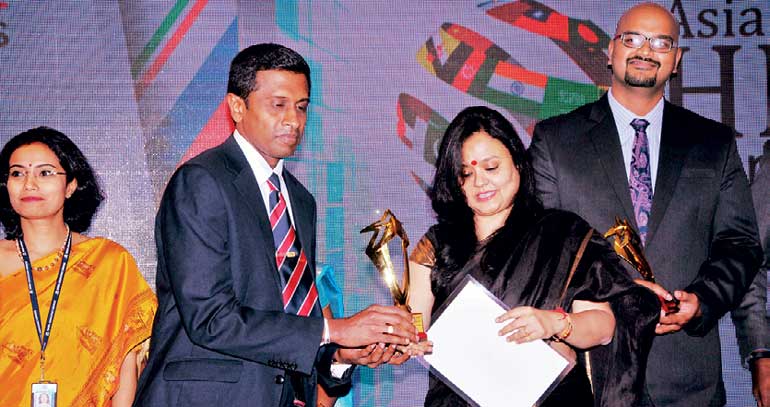Tuesday Feb 24, 2026
Tuesday Feb 24, 2026
Thursday, 15 September 2016 00:00 - - {{hitsCtrl.values.hits}}
 Hayleys Plantation Sector Senior Manager – Human Resources Anuruddha Gamage accepting the ‘Award for leading HR practices in quality work-life’ at the Asia Pacific HRM Congress
Hayleys Plantation Sector Senior Manager – Human Resources Anuruddha Gamage accepting the ‘Award for leading HR practices in quality work-life’ at the Asia Pacific HRM Congress
The Hayleys Plantations Sector was adjudged number one in Asia for its quality work-life HR practices and was presented the ‘Award for leading HR practices in quality work-life’ at the Asia Pacific HRM Congress.
Held in Bangalore India in September, The Asia Pacific HRM Congress Award 2016 recognised the Hayleys Plantation Sector’s exceptional contribution towards driving innovative and game-changing HR practices and initiatives towards the development and uplifting of its direct workforce of 20,000 and extended plantation community of 110,000.
The Hayleys Plantation Sector was the only Sri Lankan Company to be recognised. The award underpins the Hayleys Plantations Sector’s unconventional and pioneering HR practices which stand out amidst the Asia Pacific business community.
Hayleys Plantation Sector Managing Director Roshan Rajadurai stated: “Our HR practices go over and beyond the traditional norms of the plantation management strategies. We have broken boundaries and shaped and designed human resource development strategies which embrace new thinking and in turn has immensely improved productivity and employee morale and has helped us elevate the quality of work-life of our human assets. These strategies showcase our deeply rooted commitment to our plantation community. We are honoured to have put the Sri Lankan planation sector on the map by winning this prestigious award and being adjudged the best in the Asia Pacific region for our HR practices.”
The plantations sector employs nearly 20,000 people, and supports another 110,000 people in the plantation community. Hayleys owns and manages two plantation companies, Kelani Valley Plantations (KVPL) and Talawakelle Tea Estates (TTEL) and manages 44 tea and rubber estates, over 19,500 hectares of land and account for 3.8% and 3.4% of Sri Lanka’s tea and rubber production respectively.